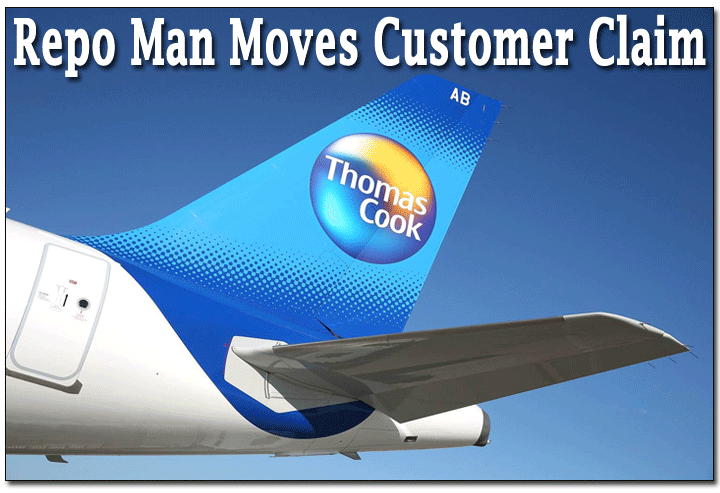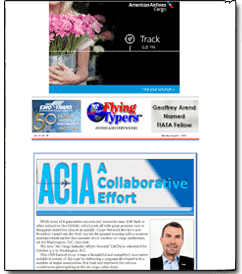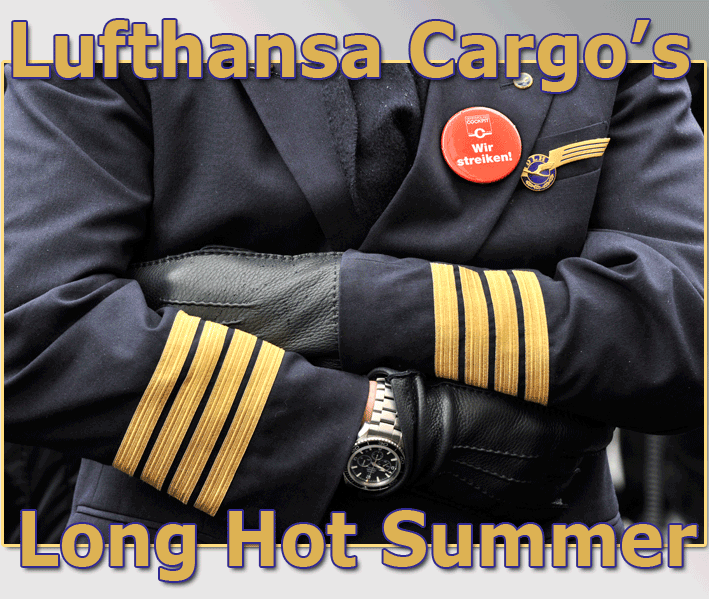
Despite the best laid plans,
labor relations with employees in both the passenger
and cargo divisions of Lufthansa are key to the
carrier’s future.
“Lufthansa
Cargo is under the obligation to post profits
or it will cease to exist independently and be
reintegrated in the carrier's passenger division.”
That statement,
made by Lufthansa Cargo Senior VP-Europe and Africa
Joachim Haas in 1998 came to mind yesterday. According
to outgoing Lufthansa Chief Financial Officer
Simone Menne, the carrier will post a loss this
year due to "massive overcapacities"
among air-freight carriers.
The loss at Lufthansa
Cargo unit will be its first in six years.
The Summer of 2016 may
be remembered as the season Lufthansa Cargo attempted
to right itself by charting a course through some
tough business skies, lowering costs and dreaming
up some new markets as the route to improved results.
So far, the news
out of Frankfurt where LCAG is headquartered has
centered around an ambitious austerity program
titled C40, which, if enacted, will see a whopping
cutback of almost 20 percent, or 800 of a total
4,600 of LCAG’s worldwide staff axed.
Those numbers include
downsizing and resultant job loss for roughly
500 Lufthansa Cargo staff in Germany.
Additionally, at
least two (and probably more) of Lufthansa Cargo’s
current Jet-A guzzling 14 M1F freighters will
be gone.
The total fleet
on the other side of all of this—including
the 777Fs, also operated by LCAG—is marked
up to be 17, according to the carrier.
Other measures aimed
at improving yield and competitive edge originally
advanced by the carrier as core parts of the “Lufthansa
Cargo 2020” roadmap—entailing investments
of about 2 billion Euros (US$1.1 billion) for
fleet renewal, a new IT system, and replacing
the 1970s handling facilities at FRA hub with
a modern facility dubbed “LCC neo”—have
been put on hold.
Bottom line, Summer
2016 witnesses slashing costs as the main focus
at LCAG.
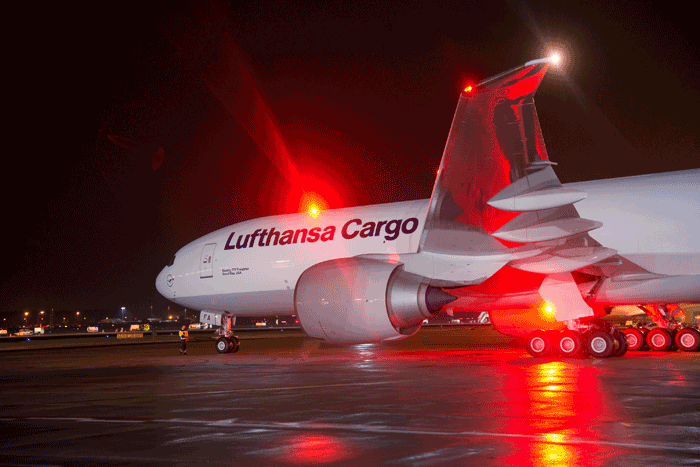 |
Staff
Grievance
For the record,
both Lufthansa Passenger and Lufthansa Cargo have
repeatedly experienced service interruptions as
employees have staged various grievance work stoppages
during the past few years.
There is no sign
that labor will roll over easy as German services
union VerDi is already organizing protests against
the planned layoffs and salary reductions within
both the LCAG workforce and the LH Maintenance
unit.
Sources tell FlyingTypers
that “it is difficult to see how any of
the envisioned cost savings in line with service
improvements can be implemented in the short or
medium term range.”
Enter
Some Bright Ideas
Peter Gerber, CEO
of LCAG, has of late announced a number of new
products to be rolled out by LCAG that are obviously
meant to boost market image and improve yield
and market share of LCAG while lowering unit costs.
Gerber, who has
been serenaded by the German Daily Handelsblatt
as possessing a “calm but assertive leadership
style,” certainly has not left much doubt
about that when describing Lufthansa Cargo’s
new products.
As for assertiveness,
during this period of change and lower yields
the air cargo industry is taking a wait-and-see
approach.
One cornerstone
of the new LCAG products offering is centered
on an initiative branded “myAirCargo,”
a product targeting private passengers with a
particular focus on Lufthansa passengers.
So far, myAirCargo
is only in the testing phase, available to employees
of Lufthansa and Austrian Airlines by logging
in with an employee ID card.
The
Pitch
 “Lufthansa
Cargo has often been a pioneer in the past when
it comes to developing and launching new products
and services,” Mr. Gerber declares. “Lufthansa
Cargo has often been a pioneer in the past when
it comes to developing and launching new products
and services,” Mr. Gerber declares.
“We want to
live up to this again with myAirCargo,”
he assures.
The claim that the
myAirCargo product will enable passengers and
other private individuals to ship any kind of
personal item via air freight, and that shipping
will be a “quick, simple, and cost-effective
experience” are among the many advantages
of myAirCargo, according to Lufthansa Cargo.
However, exactly how myAirCargo compares to similar
services available by Postal Operators and Integrators,
and even specialists in the travel agency trade
so far is unexplained, as perhaps LCAG is evaluating
employee shipping results so far.
Between
The Lines
As we read it,
the myAirCargo roadmap could eventually allow
cargo bookings to be made by the traveler utilizing
a specialized app, which presumably will be made
available in IOS and Android versions.
LCAG advanced just
how myAirCargo might work for the consumer, while
offering a tasty example, but all of it might
very well turn out to be pie in the sky.
“You want
to take a biking tour on the legendary Route 66
across the USA? In that case just buy a ticket
and book your motorbike to accompany you as an
air freight shipment and we together with local
forwarding partners will take care of the rest,”
exclaims LCAG CFO Martin Schmitt.
But that glorious
word picture aside for a moment, we wonder what
is new about this product offering?
 For
example, currently there are a number of specialized
travel agents that offer motorbiking tours to
the most remote locations of the globe and include
transportation of equipment (read motorbike),
required visa, and other services for the trip,
both for individuals and for groups. For
example, currently there are a number of specialized
travel agents that offer motorbiking tours to
the most remote locations of the globe and include
transportation of equipment (read motorbike),
required visa, and other services for the trip,
both for individuals and for groups.
One issue that stands
out in the example cited by Mr. Schmitt is that
the motorbike is considered dangerous goods under
the IATA Dangerous Goods Regulations (DGR), rules
that LCAG must strictly observe.
Motorbikes are classified
as “UN 3166, vehicle, internal combustion,
flammable liquid powered” and their preparation
for transport requires strict adherence with Packing
Instruction 950 in the IATA DGR. To prove such
adherence with the required standards, the shipper
must sign a formal transport document, the “Shipper’s
declaration for Dangerous Goods,” which
most individuals are legally unable to sign because
they lack the stringent training in accordance
with the mandated IATA DGR—unless they happen
to work in a position which entails shipping of
dangerous goods by air.
While presumably
LH Cargo has envisioned that the “local
forwarding partner” cited by Mr. Schmitt
signs this declaration and thus acts as a shipper,
that very action will certainly make such a service
no less expensive than motorbike movements offered
by the aforementioned specialized travel agents
and others.
An industry observer
we spoke to wondered “why forwarders should
partake in such activities which will hardly cover
costs, given the amount of work required to deal
with customers not familiar with import/export
requirements for a product where an airline targets
private shippers by circumventing the forwarding
industry?”
“myAirCargo
enables passengers and other individuals to ship
any kind of personal item via air freight,”
says Mr. Gerber, underscoring that the myAirCargo
service can include “artworks, souvenirs
or any kind of personal purchase made by a traveler.”
What
About Customs?
A customs official
at Frankfurt airport told FT: “We
would certainly inspect any and all of such shipments,
given that private shippers are typically not
familiar with VuB (the German abbreviation for
the custom’s term “Verbote und Beschränkungen;
Prohibitions and Limitations”).
“We certainly
expect to see,” the customs official continued,
“the presence of products made from endangered
species without the required CITES documentation,
undeclared dangerous goods, foodstuff without
documentation that these are fit for human or
animal consumption, and a multitude of other rather
problematic items.”
“While the
services of FedEx, UPS, and TNT include handling,
customs clearance, and door-to-door delivery,
any private shipper would require the services
of a forwarder both at origin and destination;
in case of a motorbike which is supposed to be
returned to the travelers home country twice.”
But
Will myAirCargo Work?
Talking to the
industry it seems that “myAirCargo is truly
a test,” the source said.
“Understand
that Lufthansa Cargo some time ago asked forwarders
if they wanted to participate in myAirCargo as
the handler on arrival and departure, including
packing and delivery.
“Apparently,
Lufthansa wanted to partner with the forwarders
on this offering.
“It is not
known what their experience is so far with myAirCargo
as this service (mentioned here earlier) is only
available to staff.
“But if they
want to offer myAirCargo to all passengers, my
question would be how they will categorize them?
“I would think
passenger shipments must be treated as unknown
shippers because they cannot be treated as known
shippers just because they have a ticket.
“Another question
would be if myAirCargo will create more business.
“Personally
speaking, if I am shopping at a bazaar in Istanbul
and purchase some items, I would ask the store
if they can ship and how much it will cost.
“Will there
be somebody at Lufthansa Cargo to answer my call
and questions about the cost of shipping, plus
all the other details?”
New td.basic
The second cornerstone
of the new LH Cargo products announced by Mr.
Gerber is an attempt to improve market share by
targeting price-sensitive shippers by means of
a new “td.basic” product, which will
be made available for online bookings only.
According to LH
Cargo, the transit time for the new “td.basic”
product will, on average, be three additional
days compared to its standard product for “extremely
attractive prices.”
A booking fee will
be levied in order to prevent blind bookings and
the routing of the cargo—which might be
by means of LH’s new cargo alliance partners—will
be communicated to the forwarder some time after
the booking.
Whether or not these
new products will be accepted by the industry
and yield the results expected by LCAG senior
management, only time will tell.
In the meantime,
the big picture includes an 800-pound gorilla
in the cargo terminal, as labor unrest sparked
by the C40 cost-cutting initiative takes hold,
while elsewhere cutbacks at the Lufthansa maintenance
facilities in Hamburg could also impact Lufthansa’s
future.
Finally, a thought
that is rattling around inside my head right now
was offered as a general comment in a letter this
week from our now retired but always brilliant
Special Commentaries Guru, Ted Braun.
Mr. Braun has something
of a working relationship in Germany and speaks
the language, having spent time there with his
dear mother-in-law, who lives today in Frankfurt
as a survivor.
Speaking of the
current situation in air cargo 2016 and with a
weathered eye on the Atlantic Ocean, Ted writes:
“If and when
I think of air freight, I believe that until and
unless a new business model is developed, a stagnating
global economy combined with a seriously outdated
system must eventually force fundamental change;
beyond cosmetic modifications at the edges.”
Stay Tuned.
GDA/Flossie
|
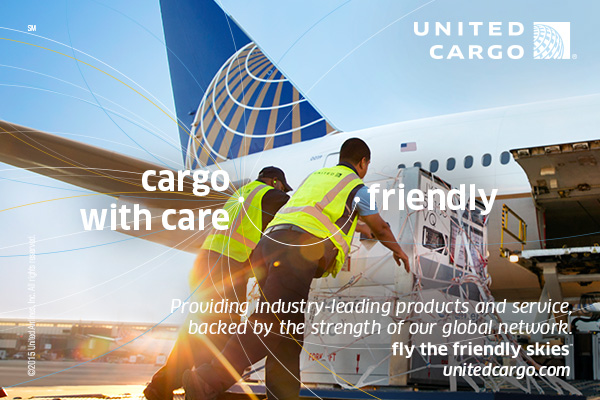


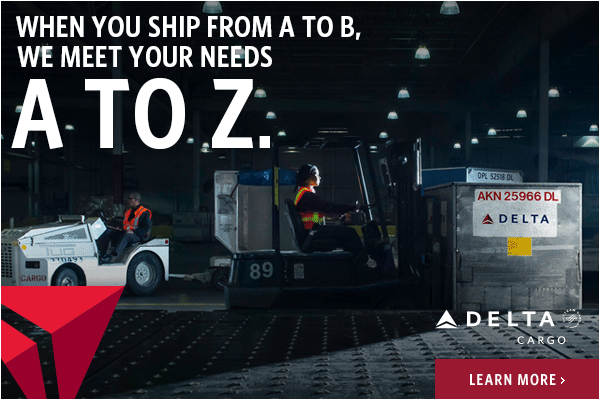






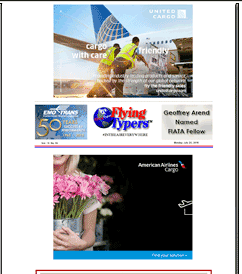




 “Lufthansa
Cargo has often been a pioneer in the past when
it comes to developing and launching new products
and services,” Mr. Gerber declares.
“Lufthansa
Cargo has often been a pioneer in the past when
it comes to developing and launching new products
and services,” Mr. Gerber declares.  For
example, currently there are a number of specialized
travel agents that offer motorbiking tours to
the most remote locations of the globe and include
transportation of equipment (read motorbike),
required visa, and other services for the trip,
both for individuals and for groups.
For
example, currently there are a number of specialized
travel agents that offer motorbiking tours to
the most remote locations of the globe and include
transportation of equipment (read motorbike),
required visa, and other services for the trip,
both for individuals and for groups.
